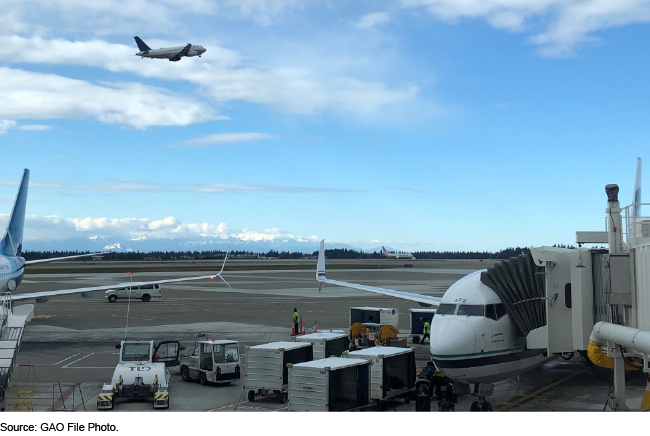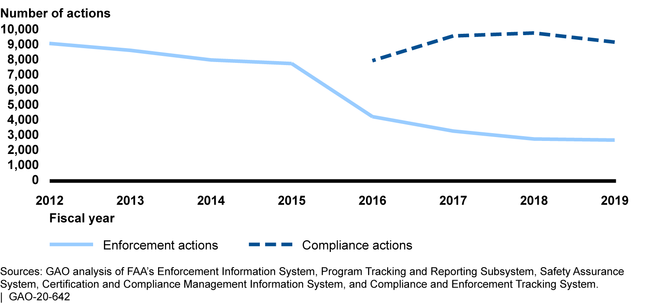Aviation Safety: Actions Needed to Evaluate Changes to FAA's Enforcement Policy on Safety Standards
Fast Facts
FAA sets and enforces safety standards for airlines, pilots, and others as a key means to achieve its mission—to provide the safest, most efficient aerospace system in the world.
FAA changed how it enforces safety standards in 2015. Its new enforcement policy encourages use of training, counseling, and other compliance actions rather than civil penalties or enforcement actions to address violations.
We found FAA has made greater use of these compliance actions since 2015, but FAA has not assessed whether the new policy is improving safety. We recommended that FAA monitor and assess the results of its new enforcement policy.

Highlights
What GAO Found
The Federal Aviation Administration (FAA) directed individual offices to implement the Compliance Program, and FAA has increasingly used compliance actions rather than enforcement actions to address violations of safety standards since starting the Compliance Program. FAA revised agency-wide guidance in September 2015 to emphasize using compliance actions, such as counseling or changes to policies. Compliance actions are to be used when a regulated entity is willing and able to comply and enforcement action is not required or warranted, e.g., for repeated violations, according to FAA guidance. FAA then directed its offices—for example, Flight Standards Service and Drug Abatement Division—to implement the Compliance Program as appropriate, given their different responsibilities and existing processes. Under the Compliance Program, data show that selected FAA offices have made increasing use of compliance actions.
Total Number of Federal Aviation Administration Enforcement Actions and Number of Compliance Actions Closed for Selected Program Offices, Fiscal Years 2012-2019 
No specific FAA office or entity oversees the Compliance Program. FAA tasked a working group to lead some initial implementation efforts. However, the group no longer regularly discusses the Compliance Program, and no office or entity was then assigned oversight authority. As a result, FAA is not positioned to identify and share best practices or other valuable information across offices. FAA established goals for the Compliance Program—to promote the highest level of safety and compliance with standards and to foster an open, transparent exchange of data. FAA, however, has not taken steps to evaluate if or determine how the program accomplishes these goals. Key considerations for agency enforcement decisions state that an agency should establish an evaluation plan to determine if its enforcement policy achieves desired goals. Three of eight FAA offices have started to evaluate the effects of the Compliance Program, but two offices have not yet started. Three other offices do not plan to do so—in one case, because FAA has not told the office to. FAA officials generally believe the Compliance Program is achieving its safety goals based on examples of its use. However, without an evaluation, FAA will not know if the Compliance Program is improving safety or having other effects—intended or unintended.
Why GAO Did This Study
FAA supports the safety of the U.S. aviation system by ensuring air carriers, pilots, and other regulated entities comply with safety standards. In 2015, FAA announced a new enforcement policy with a more collaborative and problem-solving approach called the Compliance Program. Under the program, FAA emphasizes using compliance actions, for example, counseling or training, to address many violations more efficiently, according to FAA. Enforcement actions such as civil penalties are reserved for more serious violations, such as when a violation is reckless or intentional.
The FAA Reauthorization Act of 2018 included a provision that GAO review FAA's Compliance Program. This report examines (1) how FAA implemented and used the Compliance Program and (2) how FAA evaluates the effectiveness of the program. GAO analyzed FAA data on enforcement actions agency-wide and on compliance actions for three selected offices for fiscal years 2012 to 2019 (4 years before and after program start).GAO also reviewed FAA guidance and interviewed FAA officials, including those from the eight offices that oversee compliance with safety standards.
Recommendations
GAO is making three recommendations including that FAA assign authority to oversee the Compliance Program and evaluate the effectiveness of the program in meeting goals. FAA concurred with the recommendations.
Recommendations for Executive Action
| Agency Affected | Recommendation | Status |
|---|---|---|
| Federal Aviation Administration |
Priority Rec.
The FAA Administrator should assign authority to an office or other entity to oversee use of the Compliance Program across program offices. (Recommendation 1) |
The Federal Aviation Administration (FAA) helps ensure the safety of the U.S. airspace system by overseeing and enforcing safety standards for air carriers, pilots, airports, and other parts of the aviation system. In 2015, FAA announced a change to its enforcement policy called the Compliance Program, which emphasizes collaboration and problem solving to address violations of safety standards. However, FAA continues to use more punitive enforcement actions, like assessing a civil penalty, to address violations when warranted. In 2020, GAO reported that FAA had tasked a working group for central leadership to lead initial implementation of the Compliance Program across the agency. However, this working group had moved on to other agency efforts, and FAA had not directed an office or working group to oversee ongoing implementation and use of the Compliance Program across the agency. Federal standards for internal control state that an agency should establish structure, assign responsibility, and delegate authority to achieve the agency's objectives. Without a centralized oversight entity, no one was looking across program offices to identify or share any best practices or lessons learned. Officials from one FAA field office told GAO that the Compliance Program could be improved by better sharing information on its use across the agency. These officials noted that there are lessons to be learned from how other program offices are using this and other related safety programs. GAO previously reported that FAA had assigned a single authority to coordinate other safety efforts, including efforts that cross FAA program offices. Besides the working group, FAA had several options for offices or entities that could oversee the Compliance Program. Therefore, GAO recommended that FAA assign authority to an office or other entity to oversee use of the Compliance Program across program offices. In 2021, GAO confirmed that FAA created an Executive Council to oversee use of the Compliance Program throughout FAA. The Executive Council, for example, will oversee the continued implementation of the Compliance Program and make recommendations to improve its effectiveness. As a result of its actions, FAA is now better positioned to share information and provide direction across program offices that use the Compliance Program, which will help the agency achieve the highest levels of aviation safety.
|
| Federal Aviation Administration | The FAA Administrator should collect and analyze data to monitor use of the Compliance Program across all program offices. (Recommendation 2) |
The Federal Aviation Administration (FAA) supports the safety of the U.S. aviation system by ensuring air carriers, pilots, and other regulated entities comply with safety standards. In 2015, FAA announced a new enforcement policy with a more collaborative and problem-solving approach, called the Compliance Program. Under the program, FAA emphasizes using compliance actions, such as counseling or training, to address many violations. However, FAA continued to use more punitive enforcement actions such as civil penalties when warranted. In 2020, GAO reported that FAA collected limited data to monitor the Compliance Program across program offices. Most FAA program offices were tracking data on the Compliance Program, such as the number of compliance actions taken, number of enforcement actions taken, and time needed to close actions. However, no one office was collecting and analyzing data across program offices on an ongoing basis to monitor use of the Compliance Program. During initial implementation, FAA did collect such data centrally to help gauge how each office was implementing the Compliance Program. Federal standards for internal control state that an agency should design control activities to achieve objectives and respond to risks. Therefore, GAO recommended that FAA collect and analyze data to monitor use of the Compliance Program across all program offices. In 2022, GAO confirmed that FAA had reinstituted efforts to centrally collect data on the Compliance Program. Specifically, FAA collected data and metrics from programs offices in response to updated goals and measures established by a Steering Committee that was tasked with monitoring and assessing the Compliance Program. FAA collected and analyzed this data to identify areas that were effective and areas that needed improvement for the Compliance Program. As a result of its actions, FAA is now positioned to analyze information to help it holistically manage the day-to-day functioning of its compliance and enforcement efforts.
|
| Federal Aviation Administration | The FAA Administrator should conduct an evaluation of the Compliance Program to assess the effectiveness of the program in meeting its goals. (Recommendation 3) |
In May 2025, FAA provided GAO with documentation demonstrating that the agency took actions to assess the Compliance Program. Over the past 4 years, FAA had completed annual assessments of the Compliance Program. FAA also enacted an order to require this annual reporting on the Program, which is to include information on trends in noncompliance by regulated entities. In the completed annual assessments, FAA has reported internally on the effectiveness of the Compliance Program for several goals. For example, one of the goals is that regulated persons take action to correct instances of discovered noncompliance. For each annual assessment, FAA offices reviewed data and records related to each goal to inform effectiveness metrics for the Compliance Program's goals. Each office submitted information for the effectiveness metrics to a steering committee. The steering committee used these metrics to evaluate, agencywide, how well the Compliance Program has been meeting its goals and to identify areas where FAA could improve. As a result of its actions, FAA is now better positioned to understand the effect of the Compliance Program on safety, as well as identify changes needed to further improve aviation safety and ensure the Compliance Program is working as designed, which met the intent of GAO's recommendation.
|
